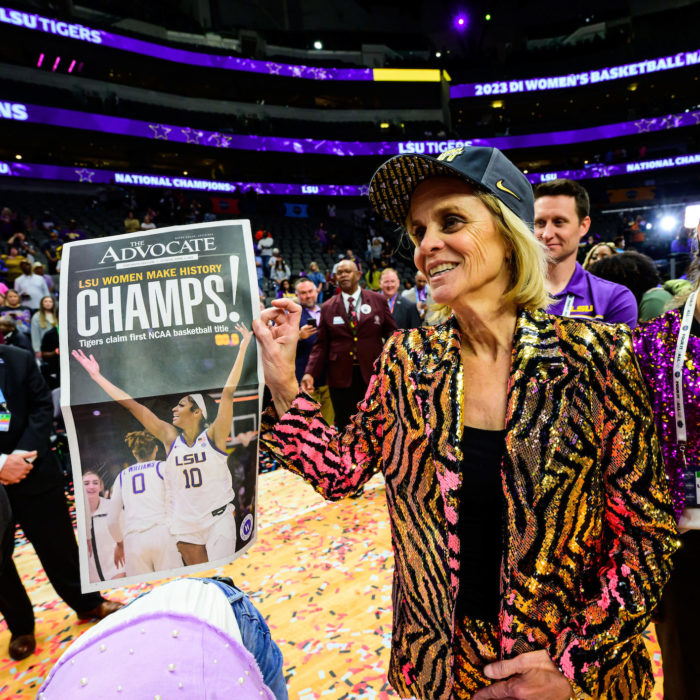Q&A with LSU’s Kim Mulkey
When Kim Mulkey’s LSU Tigers won the national women’s basketball title in April 2023, she became the first coach in the college women’s game to capture the crown at two different NCAA Division 1 schools. About six months later, LSU made Mulkey the highest paid women’s college basketball coach with a 10-year, $32 million contract.
Mulkey won her previous titles at Baylor in 2005, 2012 and 2019. Before Baylor, she was a longtime assistant at Louisiana Tech and star point guard there. She was also a member of the first U.S. women’s basketball team to win an Olympic gold medal, in 1984.
In preparing an update to Shattering the Glass, I caught up with Coach Mulkey for a few moments to reflect on the game and her career. Here are excerpts from the interview.
An LSU fan told me to ask about your being an all-star baseball player when you were growing up.
“I was a 12-year-old and tried out for the Dixie Youth baseball league. I was the only girl, and the first one selected by the worst team. I played pitcher, shortstop and catcher. At the all-star game, I was warming up and was told they would not let me play, that I wasn’t properly put on the roster. But I had been told I was an all-star.
“My dad had gotten wind of this earlier in the day and had TV cameras there. He came to the dugout and said, ‘Here are your choices: play and it’s a team forfeit, or not play, and sit outside the dugout.” I decided I was not going to punish my team. I was fighting back tears, and my teammates came by where I was sitting and tipped their caps. The situation was a form of discrimination, but as a 12-year-old, you’re thinking, ‘I can’t play because of what reason?’”
After you were a star point guard at Louisiana Tech in the early 1980s, a coaching career was not on your radar. Why?
“First of all, my degree was in business administration. I was working on an MBA on an NCAA scholarship, but Dr. F. Jay Taylor wouldn’t take no for an answer. That program was started because of students who went to his office about it, and he was a visionary. He put money in women’s basketball before most schools did.
“Coaching was not on my radar because I didn’t think I would make a lot of money doing that. CEOs made big money and traveled the world. Little did I know that is possible with women’s basketball. It is rewarding financially, and I have the opportunity to travel. At La Tech, my first salary was $35,000 a year as an assistant. To me, at that time, that was a lot of money.”
Women coaches are sometimes criticized more than male ones when they are passionate and outspoken. You’ve always exhibited those traits, both as a player and coach. How do you see this?
“I have been criticized much and many times. It doesn’t faze me. If you’re passionate about what you do and intense—what is wrong with being passionate in the athletic setting? Passiveness is not who I am. I played and coach the same way and don’t mean any harm by it; I love to compete.”
What inspires you to wear bright, sometimes glittery outfits to coach games?
“People in the fashion industry who are LSU graduates wanted to provide me with sequined jackets and things to spruce it up. We live in Louisiana, and we like colors and bright stuff.
“I have fun with this, and it’s brought a lot of conversation to women’s games at LSU. I don’t want it to be about me, but people ask, ‘What’s Kim wearing tonight?’ I know some people come to watch what I wear, and they may not have much interest in basketball. But once they get there and see what I wear, then maybe they learn about basketball and our team. For me, it’s all about the kids on the floor.”
In your 15 years as an assistant coach, what were the biggest things you learned or developed that helped make you such a highly successful head coach?
“I learned to pay attention to detail. There are things as a player you didn’t have to focus on, but as a coach I learned how important they are.
“You also learn rejection. You find out people you recruited hard aren’t going to come play for you. You learn how to pick yourself up and keep going. When I was hired at La Tech, there was no assistant (to help with recruiting). It was, ‘Here, you go figure it out.’
“I also just believe you work hard, you outwork the next institution. If you lose a kid, the one thing you don’t want to say is I didn’t work hard enough.”
You advanced parity in college women’s basketball by breaking through to a national title at Baylor after only five years at the school. You commented at the time that other schools can achieve this, too. Why weren’t more schools breaking through to the elite level?
“Maybe they didn’t have the commitment or resources. I just know how difficult it is to win a national championship. People don’t understand that—they see the glory and glamour— ‘Oh, Baylor is one of the elite.’ It was seven years between those championships at Baylor.
“At LSU, it happened after two years. Things have changed. The portal made it quicker, but it can also be detrimental and can cost you your job if all of a sudden players want to leave. We were fortunate to bring in recruits that could help us, but certainly we never thought of a national championship in only two years.
“To me, historically, why players transferred is they want to play more. Now, it can be anything, and NIL (Name, Image, Likeness deals) could be a reason. But as coaches we are limited in what we can say about that. Social media can also be an influence.”
Thinking about the audience for college women’s basketball—why do you think it has increased considerably in the last few years, and what will keep growing it?
“I think the (2023) championship game and the Final Four covered a lot of the real world–you had everything people would be interested in. It covered a multitude of facets–great talent, great coaching, great fans and a lot of trash talking. Everything was good and positive, including ratings.
“Now, everybody is on TV, social media and the internet. Everybody sees something that interests them, and it brings them out. Some people turned on that championship game and it was a revelation, ‘Oh—those girls can play—wow—that’s some talent on those teams—those coaches know what they are doing.’”
You’ve been a part of many historical moments in women’s basketball. What are the most meaningful and why?
“I don’t view myself that way. I get embarrassed when people say that. I don’t live my life viewing my accomplishments. If what you did yesterday looks big to you today, you haven’t done much today. Maybe one day when I am retired I’ll say, ‘Yeah, I did that.’”



